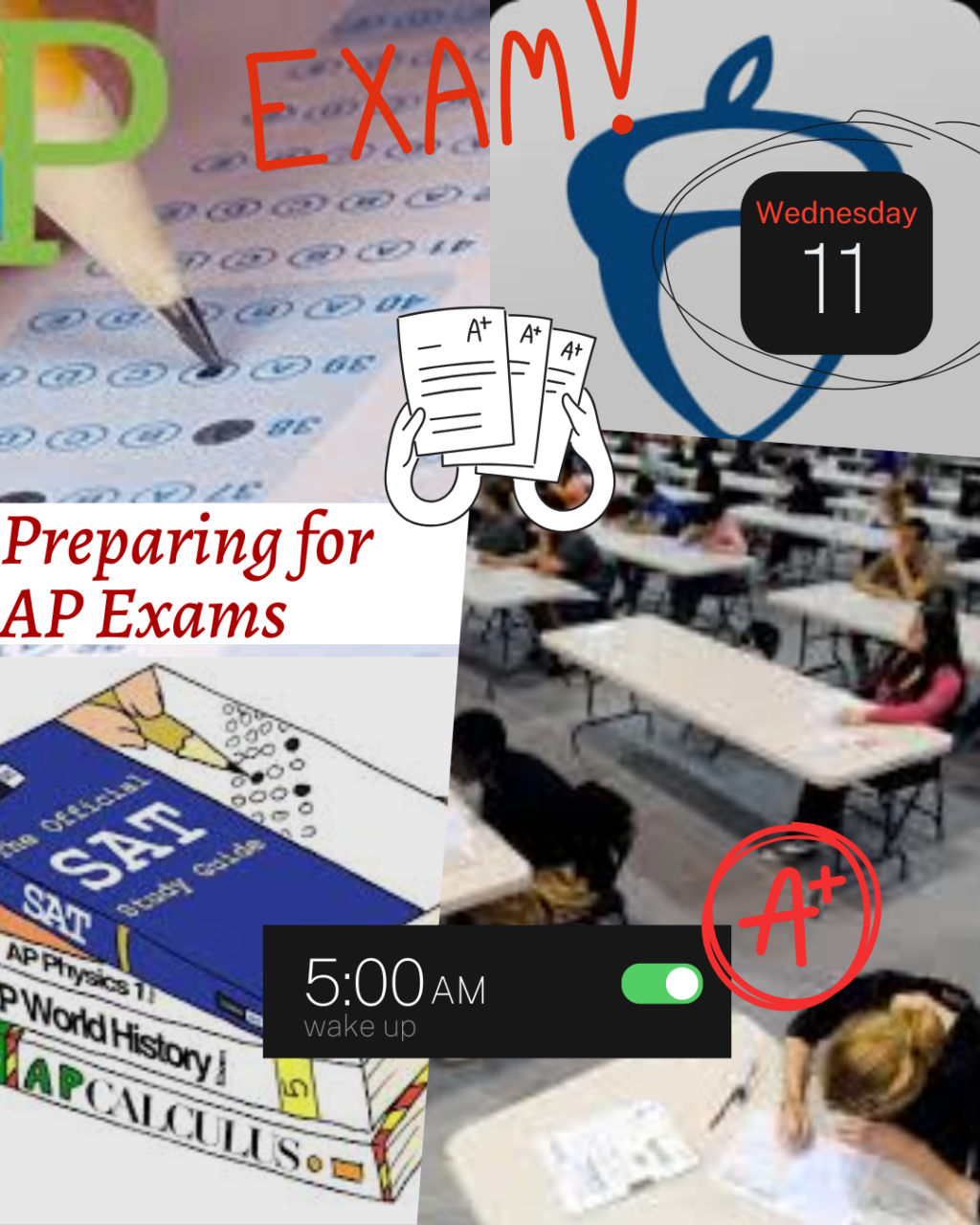
As we approach this time of the year, stress elevates, pressure creeps in, and preparation is key. Advanced Placement (AP) exams are approaching in the coming months, and students and teachers are making their best efforts to help prepare themselves and their students for these crucial exams.
The culture of these exams is to cram everything at the last minute, which intensifies the pressure and allows students to perform rather poorly on standardized tests. But, organization and preparation are keys to ensure a good score on these exams.
“Prepare! I would highly recommend that students create a study plan: you can’t just study the night before! Students should think of the content and skills they want to practice and plan to do a little bit every night for the month or so before the AP test,” claimed Sarah Straight, a former College Board exam grader and now the current AP/H Modern World History teacher at Malden High School.
Juniors Manny Perez and Sarah Fontaim, students planning to take the AP Modern World History exam, offered their perspectives on what would be best in their preparation, both from their teacher and from themselves.
“I think that they could give a lot more mock tests just so we can get a feel of it, so we’re cool with the program and like how to answer the question using contextual evidence,” Fontaim claimed.
“For AP World, I’d probably just say to take some more mock tests. Maybe not tests that count, but just some mock tests—like some multiple choice, mainly DBQs.” Perez agreed.
It is easy to fall into the trap of procrastination, but this lack of self-control leads to uncomfortable positions in the future. If students can delay gratification and remain disciplined in the task at hand, a good grade on these exams is sure to come.
Juniors Thomas Conti and Randy Nguyen offer some insight in regards to their preparation and feelings about upcoming exams.
“I think it’s unavoidable that you’re going to have nerves when you’re talking about tests, especially in subjects that you’ve never taken formal classes for. The best you can do is keep the hopes high and try to calm those as much as possible with preparation,” Conti expressed.
“It is not just AP exams; it’s finals season, and as a juniors become seniors, you have to start thinking about your future. You got a lot more than just that AP exam,” Nguyen claimed.
As teachers have been preparing their students for these demanding standardized tests, there is a process and technique varying from each teacher and their own teaching style to prepare the students to the best of their abilities.
“The entire year has been preparing my students for the exam. Every test we take has past AP exam questions, so our students should not be shocked by the format, type of question, etc. when they take the exam in May,” claimed AP Environmental Science teacher Michael Berman. The AP Environmental national exam will take place at 12 pm on May 13th.
Junior Shahd Abdulghani, a student planning for the AP Environmental exam, shared some insight in regards to her plan: “I want to go over the material, all the worksheets that Mr. Berman provided the whole year.” She further added, “I also want to watch some videos, and I’m going to ask my friends that took AP Environmental about the test and everything.”
Jessica Webber, who teaches AP Biology, is experiencing pressure but feels overall confident in the exam dates and the preparation she has put into this year’s curriculum, as AP Biology is the first exam students will be taking at 8 am on May 5th.
“We have essentially been preparing for AP exams all year by following the AP pacing guide and practicing MCQ and FRQs. We are on pace to have a few class periods to review old material the week before the exam as well,” stated Webber.
“At this point, students should trust that they have been working hard all year and refine their test-taking strategies and review major concepts. Also, getting a good night’s sleep before the test and having breakfast in the morning the day of the test will help!” Webber continued.
Yahaira Marquez, who teaches AP English Language and Composition, feels confident in her abilities to teach and prepare her students for the exam, which will take place at 12 pm on May 14th.
“I feel confident that students will do their best and do well,” voiced Marquez as her students have been “practicing and honing skills all year.” She continued, “I hope students feel the same way. Ultimately, however, it’s important to keep from solely thinking of an AP course as one that is tied to passing a test; it’s about having the ability to more deeply examine particular content, to think more critically, and engage in meaningful conversations while building skills that are useful beyond the walls of our school. So, in that sense, I feel good about what we’ve done so far this year, and the exam is just one small portion of the class.”
AP English is a lot of work. For students to maximize their chances of receiving a passing grade on the exam (3+), students must keep their minds sharp, prepared, and focused as the time constraint of these exams is said to alleviate pressure in the moment.
“I think the best way is to focus in class and truly apply all feedback on one’s work now so that when the exam comes, these moves are second nature. Also, students should ask all of the questions, be intellectually curious, be engaged–being an active participant in one’s learning is the best way to ensure one understands material, which, in turn, will increase chances of doing well on an exam,” Marquez concluded.
Brian Morrison, the teacher of one of the arguably hardest AP courses at Malden High, AP Physics, shared the method to the madness in preparing for this rigorous exam.
“My physics classes are doing a lot of work on AP Classroom. There are lots of resources and practice exams on AP Classroom, as well as review videos and past exams with solutions. Practicing multiple-choice questions is essential. Being given only three minutes per question adds stress to the exam-taking process,” Morrison explained.
For the AP Physics exam, as of 2023, students have scored an average of 2.55 out of 5, which speaks volumes about the difficulty of this course. One can only imagine the stress the students are going through, let alone the teachers who are determined to defy this average score.
“I would say that the teachers are as stressed as the students. It has been a pressure-packed few months trying to get all the material finished in time. A few more weeks and everyone can breathe a sigh of relief!” claimed Morrison.
When AP exams creep in, stress increases, and pressure boils up, it is incredibly important to maintain composure, prepare well, and trust in the studying and hard work put into these courses. Get a good night’s sleep, as recommended by many AP teachers, have a nice breakfast, and give these exams all the effort that is possible. Remember, although this test can earn a student college credit, in the end, it is just a test.






